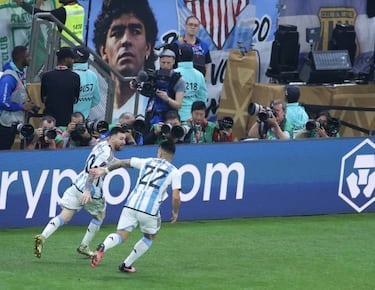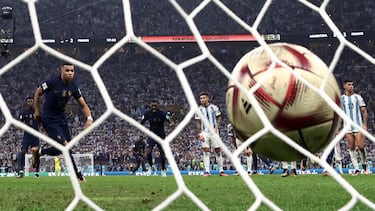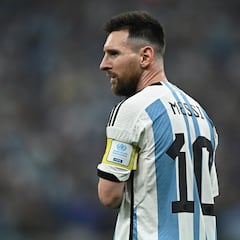Who are the all-time top goalscorers at the World Cup? Full list
Find out who are the most prolific goal scorers in World Cup history, how many goals they scored and where they stand in the historical ranking.

Before the 2022 World Cup kicked off last month, few would have placed money on Lionel Messi making his way up the all-time goalscorers’ list to pull level with the great Pelé, let alone overtake him. Prior to Qatar 2022, Messi’s World Cup tally stood at six goals from four editions - he has somehow managed to double that in one edition alone - very likely his last. From the group stage to the final, he has overtaken some of greatest Argentinean players of all-time - first Guillermo Stábile and Diego Maradona (both tied on eight World Cup goals), the Gabriel Batistuta, who up until last week was the record holder with 10.
Kylian Mbappé also leapfrogged a number of players in his ascent up the all-time ranking. He was on four goals when the tournament started and has since taken his total to 12 goals in just two editions. He scored a hat trick in the final against Argentina, becoming only the second player to achieve such a feat - Geoff Hurst being the first, for England at Wembley in 1966.
That pulled him level with Pelé on 12 goals, and now just one behind the French record holder, Just Fontaine. At Qatar 2022, Messi and Mbappé scored 15 goals between them.
⚽️ Group stage
— FIFA World Cup (@FIFAWorldCup) December 18, 2022
⚽️ Round of 16
⚽️ Quarter-final
⚽️ Semi-final
⚽️ Final
Messi has led the way at this #FIFAWorldCup 👏 pic.twitter.com/vx3FqDQTwk
Argentina’s all-time top goal scorers at the World Cup
- 13 Messi 2006, 2010*, 2014, 2018, 2022
- 10 Gabriel Batistuta 1994, 1998, 2002
- 8 Guillermo Stábile 1930
- 8 Diego Maradona 1982, 1986, 1990*, 1994
- 6 Mario Kempes 1978
*Played but didn’t score at the tournament
Messi has scored in all of Argentina’s games bar one (the group game against Poland). He became the first player in history to score in every knockout stage game from the Last 16 to the final. It’s strange to think that all six of the goals he scored in previous editions prior to Qatar 2022 were in the group stage!
His 22nd-minute penalty in the final against France brought up his 12th World goal scored during the tournament proper, equalling Pelé’s career total scored between 1958 and 1970. His extra-time strike allowed him to move past Pelé and into fourth place, a position he shares with legendary French striker Just Fontaine, who scored 13 goals all in the same edition - Sweden 1958.
You might also like
- Follow all the action and reaction to Argentina vs France live
- How many times have Argentina reached the World Cup final?
- Coincidences that have Argentina fans dreaming of World Cup glory
- More Messi milestones
Miroslav Klose, Germany - 16 goals
Miroslav Josef Klose is the top scorer in the history of the FIFA World Cup, with 16 goals in 24 appearances across four editions from 2002 to 2014.
The Polish-born German football player is also the national team’s top scorer, with 71 goals in 137 games between 2001 and 2014. He started his incredible World Cup tally by scoring a triple header hat-trick in his debut against UAE during the 2002 South Korea and Japan tournament.
During the 2006 World Cup, in his home country Germany, Klose again managed to score five goals - a haul that saw him win the Golden Boot.
His last two goals came in the semi-final of the 2014 World Cup against the host nation Brazil, his double coming as part of an emphatic 7-1 win for Germany. He would end his World Cup career by winning the trophy and making the perfect ending.
Ronaldo Luis Nazario de Lima, Brazil - 15 goals
Ronaldo is a retired Brazilian football player who went to four World Cups (1994, 1998, 2002, 2006) and won the tournament twice, scoring 15 goals in 19 appearances. Winner of three World Player of the Year awards (1996–97 and 2002). Undeniably his most memorable World Cup performance came in 2002 in Korea and Japan, where he scored eight goals - including a match-winning double in the final against Germany.
At the 2006 World Cup in Germany, he scored three goals to bring his career total to a record-setting 15 (later broken in 2014 by Germany’s Miroslav Klose).
Gerd Müller, Germany - 14 goals
The legendary striker is third on the list of the highest scorers with 14 goals in 13 matches. Müller won the Golden Boot award in his first World Cup in Mexico in 1970 and helped his national team lift the trophy four years later in 1974.
Gerd Muller scores the winning goal in the 1974 Final. pic.twitter.com/kgS6Ktpvhb
— World Cup Photos (@WorldCupPhotos1) March 10, 2014
Known by fans as ‘Der Bomber,’ Müller hit 68 goals in 62 appearances for Germany, including the winner in the 1974 World Cup final.
World Cup news
- Messi: “The final is my last game in a World Cup”
- Messi ‘inventing’ records
- What celebrations do Argentina have planned for World Cup win?
Just Fontaine, France - 13 goals
The former French professional player is famous for his performance in the 1958 World Cup in Sweden, scoring 13 goals in six games. This remains the highest number of goals ever scored by one player at a single World Cup tournament.
Leo Messi, Argentina - 13 goals
It might be hard to believe but Messi’s international career couldn’t have got off to a worse start. He was sent off just minutes into his senior debut in a friendly against Hungary on 17 August 2005. It got much better after that. He was included in José Peckerman’s list squad for the 2006 finals in Germany, and debuted in the second group game, against Serbia-Montenegro, wearing the No.19 shirt. It was a landmark day for the young Messi in Gelsenkirchen - he assisted Hernán Crespo for Argentina’s fourth then got on the scoresheet himself - his first goal at senior level and first goal at a World Cup finals, wrapping up the scoring in a 6-0 win.

Fast forward four years and by the time of South Africa 2010, Messi was now the best player in the world. Messi, a starter throughout, couldn’t find the net at all in South Africa as Argentina were eliminated in the quarter finals by Germany. It would be the only World Cup in which Messi failed to score at least one goal.
Messi captained Argentina at Brazil 2014, and contributed four goals, scoring in all three of the team’s group games. Argentina made it to their first World Cup final since 1990 but the match was settled in extra-time by Mario Götze and Messi missed another chance to lay his hands on the trophy.
At Russia 2018, Argentina came close to bowing out at the group stage. A 1-1 draw with Iceland was followed by a 0-3 defeat to Croatia. In the last group game against Nigeria, Messi opened the scoring and Marcos Rojo fired in the winner. Up next were France, who outclassed the South Americans, winning 4-2 and sending Argentina home.
That brings us to Qatar 2022, Messi’s last waltz. Four of his seven goals at the tournament came from the penalty spot (Saudi Arabia, Netherlands, Croatia and France) and two from open play (Mexico, Australia and France).
Edson Arantes do Nascimento Pelé, Brazil - 12 goals
Pelé debuted at the 1958 World Cup at age 17, and his exceptional exhibitions outweighed Fontaine’s remarkable goal-scoring run at that tournament. Pelé scored six goals at his first World Cup and helped his nation win the 1958, 1962, and 1970 tournaments, with the South American giants only failing to clinch the trophy in England in 1966.
The legendary striker, also known as one of the best goalscorers ever, bagged 12 goals in 14 World Cup matches.
Kylian Mbappé, France - 12 goals
Mbappé was still only a teenager when he made his debut appearance at a World Cup finals. He led France’s attack in the 2-1 group game win over Australia at Russia 2018 but didn’t get on the scoresheet until the next game, against Peru. He hit the winner, a tap-in, but enough to start him on his way. He was on the bench for the last Group C game against Denmark and only appeared for the last 12 minutes. He made up for it with a brace against Argentina in the Round of 16 but didn’t score again until the final, his goal crowned France’s victory Croatia - a World Cup winner in his first tournament and four goals to his name.
Most goals scored in one edition of the World Cup
- 13 Just Fontaine (France) - Sweden 1958
- 11 Sándor Kocsis (Hungary) - Switzerland 1954
- 10 Gerd Müller (West Germany) - Mexico 1970
- 9 Ademir (Brazil) - Brazil 1950
- 9 Eusébio (Portugal) - England 1966
- 8 Guillermo Stábile (Argentina) - Uruguay 1930
- 8 Ronaldo (Brazil) - Korea/Japan 2002
- 8 Mbappé (France) - Qatar 2022

Kylian’s reputation had grown in the intervening years between Russia 2018 and Qatar 2022 - and his goal scoring feats grew exponentially too. He finished the tournament on eight goals, joining an elite group of eight players to have scored eight or more goals in one edition of the tournament. He opened his account at Qatar 2022 in the first group game against Australia, then scored braces against Denmark and Poland. His hat trick in a riveting final against Argentina wasn’t enough to win the trophy but it did edge him past Messi for the Golden Boot.
The best of the rest*
11 - Sándor Kocsis, Jürgen Klinsmann
10 - Helmut Rahn, Gary Lineker, Gabriel Batistuta, Teófilo Cubillas, Thomas Müller, Grzegorz Lato
Related stories
9 - Ademir, Eusébio, Christian Vieri, Vavá, David Villa, Paolo Rossi, Jairzinho, Roberto Baggio, Karl-Heinz Rummenigge, Uwe Seeler
*As of 18 December 2022

